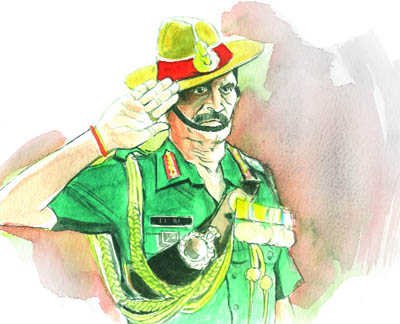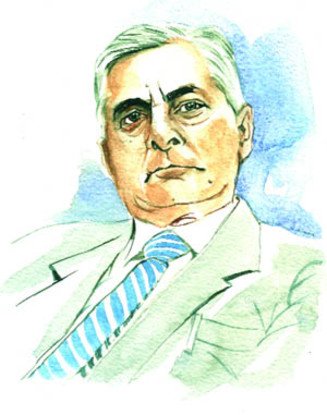I regularly browse through Sainik Samachar, the journal of our armed forces published on behalf of the Ministry of Defence. In the latest issue, dated November 1-15, there is a photograph of Gen Dalbir Singh, Chief of the Army Staff, at Amar Jawan Jyoti during the Infantry Day (October 27) celebration. Infantry Day commemorates the landing of a battalion of the Sikh Regiment in Srinagar in 1947, to chase away the Pakistani intruders.

In the photograph, Gen Dalbir Singh is looking resplendent in his full uniform. But, jarringly enough, the good General is sporting a mauli on his right wrist.

The General is in good company. An inside cover photograph shows Lt Gen Aniruddha Chakravarty, and he too has a mauli on his right wrist.
And, then, there is a group photograph of “war veterans, colonels of Infantry Regiments and the serving officers” at India Gate. At least four officers in the front row can be seen wearing maulis.
This issue of Sainik Samachar has many photographs of the Defence Minister, Hon’ble Manohar Parrikar, also sporting a thick mauli. He is a politician and probably not subject to the rules and regulations or dress codes of the forces. And, these rules and regulations are clear, unambiguous and uniformly applicable to all ranks.
But, the Army Chief and other senior officers displaying a religious insignia is a different matter. And an unhappy lapse. It is totally at variance with the image of a professional army.
Earlier, very many people had felt disappointed that the Chief and some other officers had permitted themselves to be inducted in the Yoga Day celebrations. All said and done, that celebration was Prime Minister Narendra Modi’s political project.

Our armed forces have an honourable and glorious record of maintaining a respectful and professional distance from the political crowd. This tradition and discipline must not be allowed to get diluted for the sake of our republic’s long-term health.
The best gift I received this Diwali was from my friend Krishna Prasad, editor of Outlook magazine. Krishna is an old-fashioned, uncomplicated, open-minded soul who has ensured that the magazine remains a staunch and robust liberal voice. The gift he sent me is a slim volume of Tiruvalluvar’s The Tirukkural. It was re-published a few months ago as Aleph Classics.
The Tirukkural, as we know, is a Tamil classic, written more than 2,000 years ago and is regarded as one of the world’s greatest literary and philosophical masterpieces. This new version has been produced by Gopalkrishna Gandhi, who has thoughtfully rendered the model book accessible to the twenty-first century reader.
Gopalkrishna Gandhi is himself one of the wisest men around. He has had a distinguished public career and is now one of the sanest voices in national life. I came to know him rather well when he was Secretary to President KR Narayanan. The Narayanan presidency coincided with some of the most difficult days for the Indian republic and it must have been a great help to him to have had a sound man like Gopal as a counsellor.
What Gopal has now done is a remarkable example of what a public intellectual can or should do — producing books and essays, bringing the reader face to face with ideas and thoughts, which in turn help the reader make sense of a bewildering world around her. In this case, Gopal says he has “tried to render it into the English of our globalised times”. This is not a vain boast. The other day, on the train journey from Delhi to Chandigarh, I managed to finish the book. Made a sobering and absorbing reading.
The great Tiruvalluvar’s classic has been translated many a time. What Gopal has done is to give us an “interpretation in an English the twenty-first century might be happier with as a medium of its conversation with the nameless and ageless Wise One”.
In his introduction, Gopal pithily sums up: “The Tirukkural uses the pathways of analysis and contemplation to advance a state of balance in private living and public duty.”
The Tirukkural is a compendium of sane advice to kings and citizens alike. What was working 2,000 years ago seems to be applicable even today. Let Gopal tell it: “It shows that intrigue, slander, flattery and deceit are not new to Indian politics. Nor an itching royal palm. What is beyond comfort, and in fact, brings sheer joy, is Valluvar’s assurance that when a neglectful or corrupt ruler is hated by the people, his days are strictly numbered.”
The Tirukkural has that quality of great books: one can open it at any page and find a nugget of wisdom. For my money, Chapter 55, titled Just Rule, is remarkably helpful in understanding our current predicaments:
“All creatures look up to the sky for rain, All subjects for justice to the king’s domain.”
However, I am not sure if Chapter 90, labelled Not offending the great, would resonate with the temper of the modern times. Here the advice is:
“Slight not those in power or ‘the mighty’ as they’re called
If you don’t want to be blacklisted or worse, be blackballed.”
Perhaps, not in tune with the spirit of “the argumentative Indian” generation.
Talking of wise men, a few days ago, I met in Delhi my old friend Hans Raj Bhardwaj, a former law minister and one of the men most knowledgeable about the intricacies and nuances of the relationship between the judiciary and the executive. Bhardwaj had an interesting aside about the incoming Chief Justice of India, Mr Justice Tirath Singh Thakur.
Contrary to the prevailing perception that the judicial appointments in the country are a byproduct of internal networking, the young Thakur’s career has a different tale to tell. His judicial passage turned out to be rather difficult precisely because of his connections. According to Bhardwaj, Thakur’s elevation to the high court got embroiled in his father’s politics.
Mr Justice Thakur is the son of the late DD Thakur, who was an eminent lawyer and minister as well as adviser to Sheikh Abdullah. The senior Thakur was the Sheikh’s counsel when the Kashmir leader was arrested for so-called anti-national activities. Bhardwaj says that the Abdullah family’s enemies in Delhi were not all that excited about DD Thakur’s son getting a high court judgeship. And, they tried very hard to delay it as much they could, but eventually, sane voices prevailed.
So much for being ‘connected’.
I received the following succinct epigram, that is being widely shared on social media, from a reader, Hirdepal Singh, in response to last week’s Kaffeeklatsch about the terror attacks in Paris:
Notice the coverage of the Paris attack
Did you see any dead body or blood?
Did you hear any comments from the Opposition parties?
Did you see any media people trying to put words into the mouth of victims?
Did you see display of any chest beating by the relatives of the deceased?
Did you see any upmanship in broadcasting of news?
Did you see any mediaperson asking any stupid question to victims or their relatives?
Time for our media to learn ethics and discipline! Amen.
Coffee, what do you say?
kaffeeklatsch@tribuneindia.com
